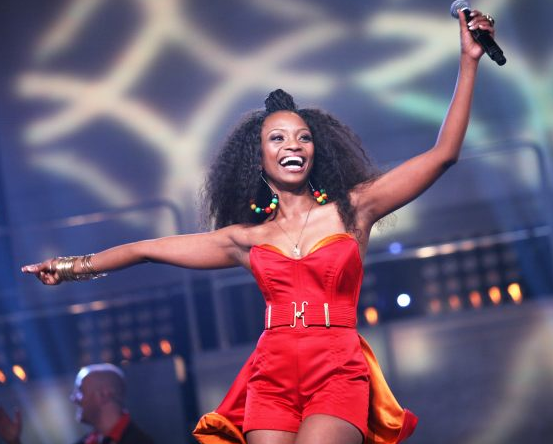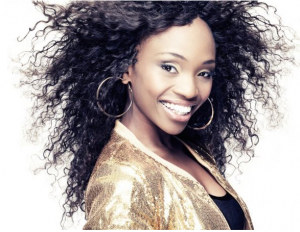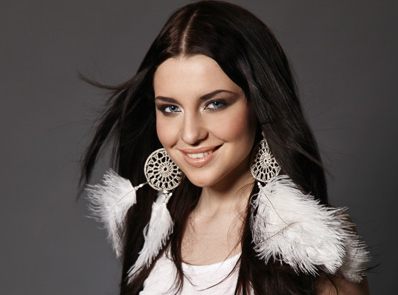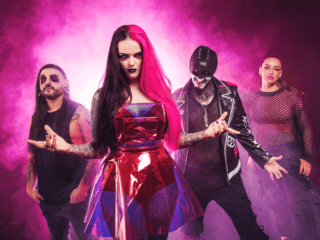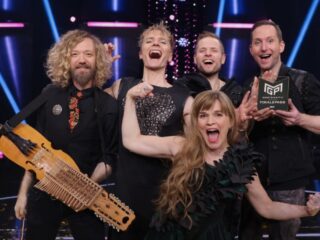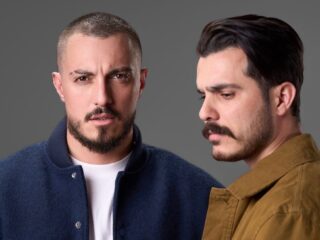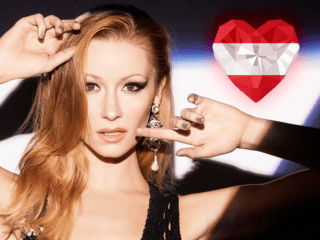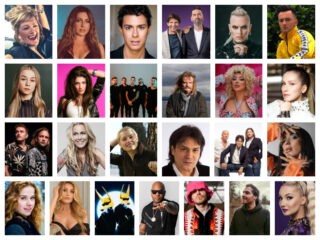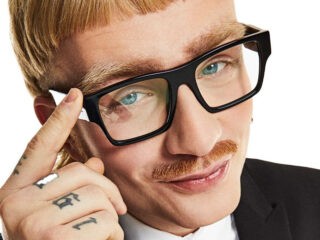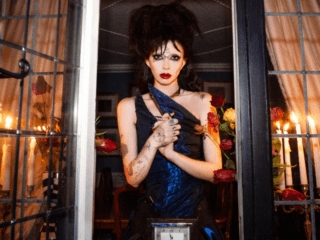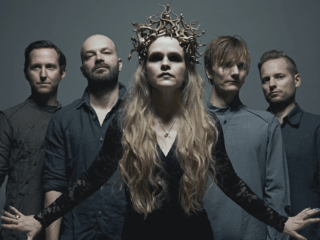Stella Mwangi is already a pioneer of Norway’s hip-hop scene, and soon she may become the first black woman ever to win Eurovision. In part one of our two-part interview, Stella discusses her victory at Melodi Grand Prix, and recounts what it was like immigrating to Norway as a little girl.
Congratulations on your win at Melodi Grand Prix! Have you been keeping busy?
My life has been flipped upside down. I’ve been so busy. I went from just being in the studio and wishing my day was coming—and then BANG it happened! Everyone wants to talk to you. Everyone wants to take pictures. It’s weird.
Has it been difficult adjusting to that?
At first it was kind of difficult. Everyone sees my dream now. I’ve been having this dream for so long and I’ve been trying to explain something that’s not here. It’s like everyone else was blind. But then everyone suddenly saw my dream. That is what shocked me the most. But handling all the interviews and the media and the fans, that’s not a problem. I’ve been practicing in my dreams!
When the votes were announced at Melodi Grand Prix you looked seriously overwhelmed. What was going through your mind?
It’s like I’d had this baby inside my stomach. And then when I saw all the votes I realized it’s finally happening, you see? You get overwhelmed. It’s more than words can actually describe. The only thing I could do was could was cry because I was so happy. All those people saw my dream and voted for me. That really touched me. That day everything opened up. I had to cry, and I couldn’t stop it.
What is the message of your song “Haba Haba”?
My song “Haba, Haba” (hujaza kibaba) has a very strong message. It’s about making the best out of every single step you take. A million-mile journey starts with one single step. And you have to make the best out of today in order to have a brighter day tomorrow. It says little by little fills up the measure.
So is this a personal philosophy?
I’ve been living my life like that since I started doing music when I was eight years old. Back then I thought I was gonna be Michael Jackson by the time I was nine years old. I learned that it’s a long journey, and I just have to open my eyes to catch everything. And when I look back to all my days it just makes sense. I had to go through everything I’ve been through in order to be my best and to handle this.
We loved your red dress at Melodi Grand Prix. Is it by a Norwegian designer?
The dress had to be something that I could stand for the rest of my life. So it was very normal for me to take in my African roots. I have a friend who is an up and coming designer so I called her and said we had to handle the dress. We had like two weeks. I wanted to look stunning. Basically I am a rapper, so I have to have something that I can still feel cool in. I told her what I liked and a week later the whole costume was done.
 Will your stage performance in Düsseldorf be similar to your performance at Melodi Grand Prix?
Will your stage performance in Düsseldorf be similar to your performance at Melodi Grand Prix?
I can tell you this Wiwi: the show in Düsseldorf will be upgraded, including my outfit. But I can’t tell you more than that because then it won’t be a surprise!
Have you listened to any of the other Eurovision songs that will be competing this year?
I’ve listened to some, but not that much. Basically when I’m on the net I’m not surfing anymore. I’m just working. I’ve seen the one from Armenia and the one from Switzerland. The girl from Switzerland [Anna Rossinelli] has a little bit of a reggae touch. I liked it. That’s what I love about this competition. We all have different backgrounds. The music is different. Most people won’t expect “Haba Haba” to be the Norwegian anthem.
What does it say about Norway that it chose a black Kenyan immigrant?
It says we are on a whole new level now. Times have changed. What I love is that people voted for the song not the look or the color. That’s also partly what really touched me. Coming to Norway as a four or five year old with my family as political refugees, and now growing up here in Norway and finding my talent, and now finally getting to represent this country with my talent. There were days when if you were Norwegian you had to look like this or talk like this. Norway proved those days are over. I love Norway for that. I’m proud to be Norwegian!
Why did your family leave Kenya?
My father was a journalist. He wrote some things about president Moi [ who the United Nations later accused of widespread human rights abuses], and at that time if you knew about the truth you were supposed to lie about it. But my dad was one of them that actually wrote the truth. The rest is a long story, but we made it out.
Did having a journalist for a dad influence you in any way?
I’ve learned a lot from my parents. It’s important for them that us kids have the freedom of speech. It has always been really important for them to know that we’re not afraid to express our feelings or to stand up for what is right and say what is wrong. That’s why I started in the music.
Part of “Haba, Haba” is sung in Swahili. How did you learn to speak the language?
My parents were like, “Okay, we’ve moved to Norway and we are going to try to be as Norwegian as we can. But it’s very important you know your background because without your history you wont’ know your future.” They started teaching us our mother tongue, which is Swahili. They taught us the languages through music. My father was teaching us songs like “Hakuna matata.” That was a good way to know jambo, jambo bwana. That’s “Hello. How are you?”
And how did you get into hip-hop?
I got into the hip-hop because I have always been writing diaries. The first track of hip-hop I ever heard was actually Public Enemy “Fight the Power.” My father played that song to us. My sisters and brother are four years older than me. They started to listen to NWA and those guys. That’s when my dad said, “If you’re really going to do hip hop you have to make sense. You have to put your feelings into rhythm and poetry.” I just started seeing what I had written in my diary and tried to put a rhythm to it. That’s how I got into hip-hop and that’s why I love hip-hop. It made a difference in my life. With hip-hop I could be as cool as I wanted. I was just a little shy girl, but when I started doing hip-hop I felt more complete. I felt that I wasn’t scared any more. I wasn’t scared of saying what I feel and I could do it in a tough way. Hip-hop has really made a huge difference in my life.
Norway is known for being a very white country. Was it difficult for you as a black immigrant?
Norway was so different from Kenya. We came in the wintertime. We arrived in snow and had to buy skis and skates. It was the whole package. It was like, “Bang! Here you go!” We moved to a small place called Eidsvoll. There were no foreigners there. It was weird to begin with. That’s why I love the fact I started music at an early age. It gave me more confidence in myself. After that I wasn’t very shy anymore.
Do you wish you had grown up in a bigger city like Oslo?
I’m happy we moved to a very small town like Eidsvoll. If we had moved to Oslo I don’t think I could have gotten so much time to really dig in to what I like doing. In Eidsvoll nothing was happening, and I mean nothing. We didn’t have any other choice but to listen to music and watch music videos and dream. That’s why I loved the fact that I realized an early age what I wanted to do with my life.
Why did you want to compete at Melodi Grand Prix this year?
I’ve always been a huge fan. When we moved to Eidsvoll what we watched was Melodi Grand Prix and the skiing. I fell in love with the costumes and the make up and the hair, and them getting to be so free in front of so many people. That’s what I love. I promised myself when I was in Eidsvoll that I would one day stand on that stage. I didn’t know how or when. I was just waiting for the right time.
And why was this year the right time?
Well, So many years went by. I actually forgot about Melodi Grand Prix. There was a time that in order to be in the MGP you had to have a certain type of song. Eurovision was in Oslo last year so I watched it and I got the same feeling I had when I was in Eidsvoll. I just felt like, “Wow! I want to stand there. I want to do that.” I told my producers the idea and they said for sure let’s do it. So we actually made three songs for Eurovision because I wanted to explain who I am. I didn’t just want to do a pop record. I really wanted it to have a message that was bang! Here is Stella. So I felt okay, if I can’t rap let me try to sing in Swahili. That’s a difference and having some African rhythms. I just tried to express myself in a different way.
Come back in a few days for part two of our interview. Stella tells us about her favorite artists and explains that she does rap–but not gangster rap!
Love, Wiwi
